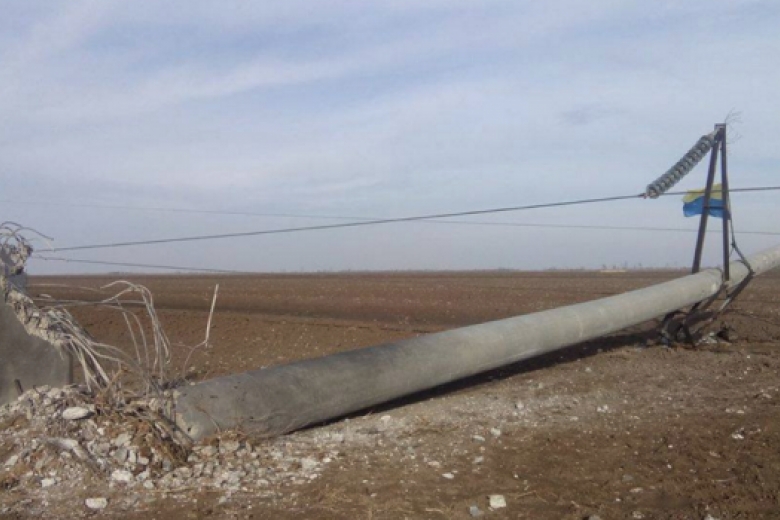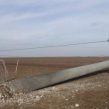
Ukraine Stops Power Supply to Russian-Annexed Crimea
Publication: Eurasia Daily Monitor Volume: 13 Issue: 3
By:

Shortly before its residents rang in the New Year, the Russian-annexed peninsula of Crimea again found itself entirely without Ukrainian electricity. As in November, this was caused by unidentified saboteurs who blew up a power transmission line tower in Ukraine’s Kherson province, which borders Crimea. However, this time, Kyiv is unlikely to restore the power supply. First, Ukraine’s electricity contract with Russia regarding supplying Crimea has expired, and both Kyiv and Moscow are reluctant to sign a new one for political reasons. And second, Crimea depends on power from mainland Ukraine to a much lesser extent than in November, as Russia in December boosted its own supplies to the occupied peninsula and flew in power generators.
A fallen electricity pylon was discovered by emergency crews near the Ukrainian town of Kakhovka in the early hours of December 31 (112.ua, December 31, 2015). As in November, Ukrainian activists were most probably behind the blast, and the Ukrainian security service has been reportedly questioning members of the far-right paramilitary group Right Sector (Hromadske.tv, January 4, 2016). Ukraine quickly repaired the pylon and the transmission line. But the power supply was not restored (112.ua, January 1, 2016), because the Russian-Ukrainian contract on supplying electricity to Crimea expired on December 31, and no new contract has been signed.
In December 2014, when Crimea could not survive without Ukrainian power, Moscow coerced Kyiv into signing the contract. Kyiv agreed to continue sending power to Crimea, which had been illegally annexed by Russia in March 2014, in return for Russia agreeing to supply electricity to Eastern Ukraine, which was short of power because of the war with Moscow-backed militants there. However, as of the end of 2015, Ukraine no longer needs Russian electricity—both because some infrastructure was restored in the east thanks to the ceasefire, and because power consumption fell in Ukraine in 2015, due to the economic recession and thanks to a warm fall and winter (UNIAN, December 15, 2015).
Consequently, Kyiv sees no economic need for new electricity agreements with Russia. In early December, no longer fearing retribution from Russian power suppliers, Kyiv restored the electricity flow to Crimea through only one of the four power lines that had been damaged in November. Pro-Moscow militants in the Donbas area stopped coal deliveries to Ukrainian power plants in response, but Ukraine had managed to already store enough coal for the winter, so there was no immediate damage to the economy (BBC News—Ukrainian service, November 27, 2015; Rian.com.ua, December 8, 2015).
Politically, Kyiv feels the urge to punish Moscow and pro-Moscow Crimeans for the annexation. Therefore, police did not interfere when Ukrainian (including far-right groups) and Crimean Tatar activists prevented emergency crews from fixing the exploded power pylons in Kherson province for two weeks in late November and early December. On November 23, Ukrainian Prime Minister Arseniy Yatsenyuk urged prosecutors to punish those who wrote up the Crimean power contract because in its wording, he said, it provided for supplies to a federal district of Russia, rather than to the Ukrainian Crimean Autonomous Republic (Pravda.com.ua, November 23, 2015). Kyiv supports the view expressed by the Crimean Tatar leaders in exile, Mustafa Cemilev and Refat Chubarov, who are members of President Petro Poroshenko’s faction in parliament. They argue that if a new contract is signed with Russia, it must provide for power supply to a “Russian-occupied Ukrainian territory,” rather than to a “federal district of Russia” (Interfax-Ukraine, December 30, 2015).
Russia is not prepared to back down, however. During the severe blackout in November, it flew in power generators from across the Kerch Strait in order to cover basic power needs. It also laid several power cables across the strait to Crimea in December—the so-called “energy bridge” (see EDM, December 14, 2015). As a result, Crimea’s dependence on Ukrainian electricity quickly fell to around 25 percent from 70–80 percent. Furthermore, Moscow claims that there will be no need for Ukrainian electricity in Crimea at all after May 2016, when more power cables will link Krasnodar territory to Crimea (Kommersant, December 21, 2015; UNIAN, December 24, 2015).
For the time being, however, Crimea relies on Ukrainian electricity, so the Kremlin has been busy shaping public opinion in order to justify the recurrent blackouts. Sergey Aksyonov, the flamboyant Kremlin-appointed head of Crimea, said in December that he shared the opinions of the numerous Crimeans who wrote to him on social networks that power purchases from Ukraine should be stopped (Gazetacrimea.ru, December 8, 2015). Shortly afterwards, Vladimir Putin instructed the government not to sign a new power contract on Crimea with Ukraine (Gazeta.ru, December 9, 2015). Most recently, Kremlin pollsters reported that 93.1 percent of Crimean residents did not want a new power contract with Ukraine, if this document referred to Crimea as part of Ukraine, rather than part of Russia. The poll was conducted by Moscow-based WCIOM, apparently within hours after receiving orders from Putin, which raises doubts about its accuracy (TASS, January 1, 2016).
Meanwhile, the most recent cold wave has again caused two million Crimeans deprived of Ukrainian power to suffer. As of January 3, Crimea was running on 930 megawatts of electricity, including 417 megawatts supplied from Krasnodar territory, compared to 1,350 megawatts needed, according to a representative of the Russian emergencies ministry (RIA Novosti, January 3, 2016). Almost certainly, Crimeans are in for a harsh winter if Russia and Ukraine do not come to a new agreement soon.




